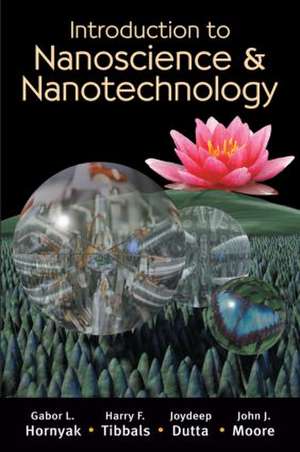Introduction to Nanoscience and Nanotechnology
Autor Gabor L. Hornyak, H.F. Tibbals, Joydeep Dutta, John J. Mooreen Limba Engleză Hardback – 22 dec 2008
Also available in two course-specific volumes:
Introduction to Nanoscience elucidates the nanoscale along with the societal impacts of nanoscience, then presents an overview of characterization and fabrication methods. The authors systematically discuss the chemistry, physics, and biology aspects of nanoscience, providing a complete picture of the challenges, opportunities, and inspirations posed by each facet before giving a brief glimpse at nanoscience in action: nanotechnology.
Fundamentals of Nanotechnology surveys the field’s broad landscape, exploring the physical basics such as nanorheology, nanofluidics, and nanomechanics as well as industrial concerns such as manufacturing, reliability, and safety. The authors then explore the vast range of nanomaterials and systematically outline devices and applications in various industrial sectors.
Qualifying instructors who purchase either of these volumes (or the combined set) are given online access to a wealth of instructional materials. These include detailed lecture notes, review summaries, slides, exercises, and more. The authors provide enough material for both one- and two-semester courses.
Preț: 1040.36 lei
Preț vechi: 1435.57 lei
-28% Nou
Puncte Express: 1561
Preț estimativ în valută:
199.07€ • 208.40$ • 164.72£
199.07€ • 208.40$ • 164.72£
Comandă specială
Livrare economică 17-31 martie
Doresc să fiu notificat când acest titlu va fi disponibil:
Se trimite...
Preluare comenzi: 021 569.72.76
Specificații
ISBN-13: 9781420047790
ISBN-10: 1420047795
Pagini: 1634
Ilustrații: 591 b/w images, 115 tables and 791
Dimensiuni: 178 x 254 x 66 mm
Greutate: 3.43 kg
Ediția:New.
Editura: CRC Press
Colecția CRC Press
ISBN-10: 1420047795
Pagini: 1634
Ilustrații: 591 b/w images, 115 tables and 791
Dimensiuni: 178 x 254 x 66 mm
Greutate: 3.43 kg
Ediția:New.
Editura: CRC Press
Colecția CRC Press
Public țintă
UndergraduateCuprins
Perspectives
Introduction
Societal Implications of Nano
Nanotools
Characterization Methods
Fabrication Methods
Physics: Properties and Phenomena
Materials, Structure, and the Nanosurface
Energy at the Nanoscale
The Material Continuum
Nanothermodynamics
Chemistry: Synthesis and Modification
Carbon-Based Nanomaterials
Chemical Interactions at the Nanoscale
Supramolecular Chemistry
Chemical Synthesis and Modification of Nanomaterials
Natural and Bionanoscience
Natural Nanomaterials
Biomolecular Nanoscience
SECTION II:
Perspectives
Introduction
Nanometrology: Standards and Nanomanufacturing
Electromagnetic Engineering
Nanoelectronics
Nano-optics
Nanomagnetism
Mechanical Nanoengineering
Nanomechanics
Nanostructure and Nanocomposite Thin Films
Applications of Thin Films
Chemical Nanoengineering
Nanocatalysis
Nanocomposites and Fibers
Biological and Environmental Nanoengineering
Nanobiotechnology
Biomimetics
Medical Nanotechnology
Environmental Nanotechnology
Introduction
Societal Implications of Nano
Nanotools
Characterization Methods
Fabrication Methods
Physics: Properties and Phenomena
Materials, Structure, and the Nanosurface
Energy at the Nanoscale
The Material Continuum
Nanothermodynamics
Chemistry: Synthesis and Modification
Carbon-Based Nanomaterials
Chemical Interactions at the Nanoscale
Supramolecular Chemistry
Chemical Synthesis and Modification of Nanomaterials
Natural and Bionanoscience
Natural Nanomaterials
Biomolecular Nanoscience
SECTION II:
Perspectives
Introduction
Nanometrology: Standards and Nanomanufacturing
Electromagnetic Engineering
Nanoelectronics
Nano-optics
Nanomagnetism
Mechanical Nanoengineering
Nanomechanics
Nanostructure and Nanocomposite Thin Films
Applications of Thin Films
Chemical Nanoengineering
Nanocatalysis
Nanocomposites and Fibers
Biological and Environmental Nanoengineering
Nanobiotechnology
Biomimetics
Medical Nanotechnology
Environmental Nanotechnology
Notă biografică
Hornyak, Gabor L.; Tibbals, H.F.; Dutta, Joydeep; Moore, John J.
Descriere
The maturation of nanotechnology has revealed it to be a unique and distinct discipline rather than a specialization within a larger field. Its textbook cannot afford to be a chemistry, physics, or engineering text focused on nano. It must be an integrated and multidisciplinary nano textbook. The archetype of the modern nano textbook, this text builds a solid background in characterization and fabrication methods while integrating the physics, chemistry, and biology facets. The remainder of this color text focuses on applications, examining engineering aspects as well as nanomaterials and industry-specific applications in such areas as energy, electronics, and biotechnology.
